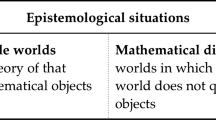Abstract
In recent years, the so-calledindispensability argument has been given a lotof attention by philosophers of mathematics.This argument for the existence of mathematicalobjects makes use of the fact, neglected inclassical schools of philosophy of mathematics,that mathematics is part of our best scientifictheories, and therefore should receive similarsupport to these theories. However, thisobservation raises the question about the exactnature of the alleged connection betweenexperience and mathematics (for example: is itpossible to falsify empirically anymathematical theorems?). In my paper I wouldlike to address this question by consideringthe explicit assumptions of different versionsof the indispensability argument. My primaryclaim is that there are at least three distinctversions of the indispensability argument (andit can be even suggested that a fourth,separate version should be formulated). I willmainly concentrate my discussion on thisvariant of the argument, which suggests thepossibility of empirical confirmation ofmathematical theories. A large portion of mypaper will focus on the recent discussion ofthis topic, starting from the paper by E.Sober, who in my opinion put reasonablerequirements on what is to be counted as anempirical confirmation of a mathematicaltheory. I will develop his model into threeseparate scenarios of possible empiricalconfirmation of mathematics. Using an exampleof Hilbert space in quantum mechanicaldescription I will show that the most promisingscenario of empirical verification ofmathematical theories has neverthelessuntenable consequences. It will be hypothesizedthat the source of this untenability lies in aspecific role which mathematical theories playin empirical science, and that what is subjectto empirical verification is not themathematics used, but the representabilityassumptions. Further I will undertake theproblem of how to reconcile the allegedempirical verification of mathematics withscientific practice. I will refer to thepolemics between P. Maddy and M. Resnik,pointing out certain ambiguities of theirarguments whose source is partly the failure todistinguish carefully between different sensesof the indispensability argument. For thatreason typical arguments used in the discussionare not decisive, yet if we take into accountsome metalogical properties of appliedmathematics, then the thesis that mathematicshas strong links with experience seems to behighly improbable.
Similar content being viewed by others
REFERENCES
Balaguer, M.: 1996, A Fictionalist Account of the Indispensable Applications of Mathematics, Philosophical Studies 83: 291–314.
Bigaj, T.: 1992, Problem uzasadniania egzystencjalnych założeńn teorii [A Problem of Justification of the Existential Assumptions of Theories], Przegl? ad Filozoficzny [Philosophical Review] 3: 45–53.
Field, H.: 1980, Science without Numbers. Princeton: Princeton University Press.
Hawthorne, J.: 1996, Mathematical Instrumentalism Meets the Conjunction Objection, Journal of Philosophical Logic 25: 363–397.
Hughes, R.I.G.: 1989, The Structure and Interpretations of Quantum Mechanics. Cambridge, MA–London: Harvard University Press.
Maddy, P.: 1992, Indispensability and Practice, Journal of Philosophy 89: 275–289.
Maddy, P.: 1997, Naturalism in Mathematics. Oxford: Clarendon Press.
Putnam, H.: 1971, Philosophy of Logic. New York: Harper.
Quine, W.V.: 1951, Two Dogmas of Empiricism, reprinted in From a Logical Point of View, 2nd ed. (1980). Cambridge, MA: Harvard University Press, 20–46.
Resnik, M.: 1997, Mathematics as a Science of Patterns. Oxford: Clarendon Press.
Sober, E.: 1993, Mathematics and Indispensability, Philosophical Review 102: 35–75.
Steiner, M.: 1998, The Applicability of Mathematics as a Philosophical Problem. Cambridge,MA–London: Harvard University Press.
Vineberg, S.: 1996, Confirmation and the Indispensability of Mathematics to Science, Philosophy of Science 63: 5256–5263.
Author information
Authors and Affiliations
Rights and permissions
About this article
Cite this article
Bigaj, T. The Indispensability Argument – A New Chance for Empiricism in Mathematics?. Foundations of Science 8, 173–200 (2003). https://doi.org/10.1023/A:1023913316307
Issue Date:
DOI: https://doi.org/10.1023/A:1023913316307



